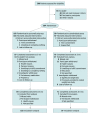Effect of a Personalized Diet to Reduce Postprandial Glycemic Response vs a Low-fat Diet on Weight Loss in Adults With Abnormal Glucose Metabolism and Obesity: A Randomized Clinical Trial
- PMID: 36169954
- PMCID: PMC9520362
- DOI: 10.1001/jamanetworkopen.2022.33760
Effect of a Personalized Diet to Reduce Postprandial Glycemic Response vs a Low-fat Diet on Weight Loss in Adults With Abnormal Glucose Metabolism and Obesity: A Randomized Clinical Trial
Abstract
Importance: Interindividual variability in postprandial glycemic response (PPGR) to the same foods may explain why low glycemic index or load and low-carbohydrate diet interventions have mixed weight loss outcomes. A precision nutrition approach that estimates personalized PPGR to specific foods may be more efficacious for weight loss.
Objective: To compare a standardized low-fat vs a personalized diet regarding percentage of weight loss in adults with abnormal glucose metabolism and obesity.
Design, setting, and participants: The Personal Diet Study was a single-center, population-based, 6-month randomized clinical trial with measurements at baseline (0 months) and 3 and 6 months conducted from February 12, 2018, to October 28, 2021. A total of 269 adults aged 18 to 80 years with a body mass index (calculated as weight in kilograms divided by height in meters squared) ranging from 27 to 50 and a hemoglobin A1c level ranging from 5.7% to 8.0% were recruited. Individuals were excluded if receiving medications other than metformin or with evidence of kidney disease, assessed as an estimated glomerular filtration rate of less than 60 mL/min/1.73 m2 using the Chronic Kidney Disease Epidemiology Collaboration equation, to avoid recruiting patients with advanced type 2 diabetes.
Interventions: Participants were randomized to either a low-fat diet (<25% of energy intake; standardized group) or a personalized diet that estimates PPGR to foods using a machine learning algorithm (personalized group). Participants in both groups received a total of 14 behavioral counseling sessions and self-monitored dietary intake. In addition, the participants in the personalized group received color-coded meal scores on estimated PPGR delivered via a mobile app.
Main outcomes and measures: The primary outcome was the percentage of weight loss from baseline to 6 months. Secondary outcomes included changes in body composition (fat mass, fat-free mass, and percentage of body weight), resting energy expenditure, and adaptive thermogenesis. Data were collected at baseline and 3 and 6 months. Analysis was based on intention to treat using linear mixed modeling.
Results: Of a total of 204 adults randomized, 199 (102 in the personalized group vs 97 in the standardized group) contributed data (mean [SD] age, 58 [11] years; 133 women [66.8%]; mean [SD] body mass index, 33.9 [4.8]). Weight change at 6 months was -4.31% (95% CI, -5.37% to -3.24%) for the standardized group and -3.26% (95% CI, -4.25% to -2.26%) for the personalized group, which was not significantly different (difference between groups, 1.05% [95% CI, -0.40% to 2.50%]; P = .16). There were no between-group differences in body composition and adaptive thermogenesis; however, the change in resting energy expenditure was significantly greater in the standardized group from 0 to 6 months (difference between groups, 92.3 [95% CI, 0.9-183.8] kcal/d; P = .05).
Conclusions and relevance: A personalized diet targeting a reduction in PPGR did not result in greater weight loss compared with a low-fat diet at 6 months. Future studies should assess methods of increasing dietary self-monitoring adherence and intervention exposure.
Trial registration: ClinicalTrials.gov Identifier: NCT03336411.
Conflict of interest statement
Figures


References
-
- Gardner CD, Trepanowski JF, Del Gobbo LC, et al. . Effect of low-fat vs low-carbohydrate diet on 12-month weight loss in overweight adults and the association with genotype pattern or insulin secretion: the DIETFITS randomized clinical trial. JAMA. 2018;319(7):667-679. doi:10.1001/jama.2018.0245 - DOI - PMC - PubMed

